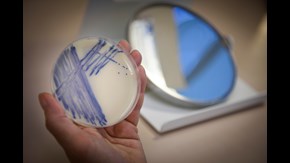Research with a One Health perspective
For more than 50 years, antibiotics have been used in human and veterinary medicine. In many countries outside the EU, antibiotics are also used to promote growth in animals. Antibiotics should be used only when needed and the selection of antibiotics to use should then be well guided to ensure maximum efficacy with minimum side effects (including resistance).

Antibiotic resistant bacteria are emerging and cause diseases in people and animals. At the same time, a small number of truly new antibiotics reach the market which leaves veterinarians and clinicians with few treatment options. It is therefore imperative to curb the development of resistance.
Increased knowledge on resistance levels is crucial
Research on antibiotic resistance is a way to gain knowledge that is needed to take measures and develop strategies against the spread of resistant bacteria and resistance genes. Improved knowledge on how to treat animals optimally with antibiotics will improve animal health and reduce the total consumption. Development of surveillance programs and novel diagnostics tools will increase the knowledge on resistance levels, which is crucial information for selecting the optimal treatment strategy.
In addition to humans and animals, bacteria are also found in our environment. An understanding of bacterial presence and its role in different ecosystems, such as soil and water, is of importance. Finally, bacteria do not respect borders, and SVA is participating in several international research projects and collaborates with research institutes and universities overseas.